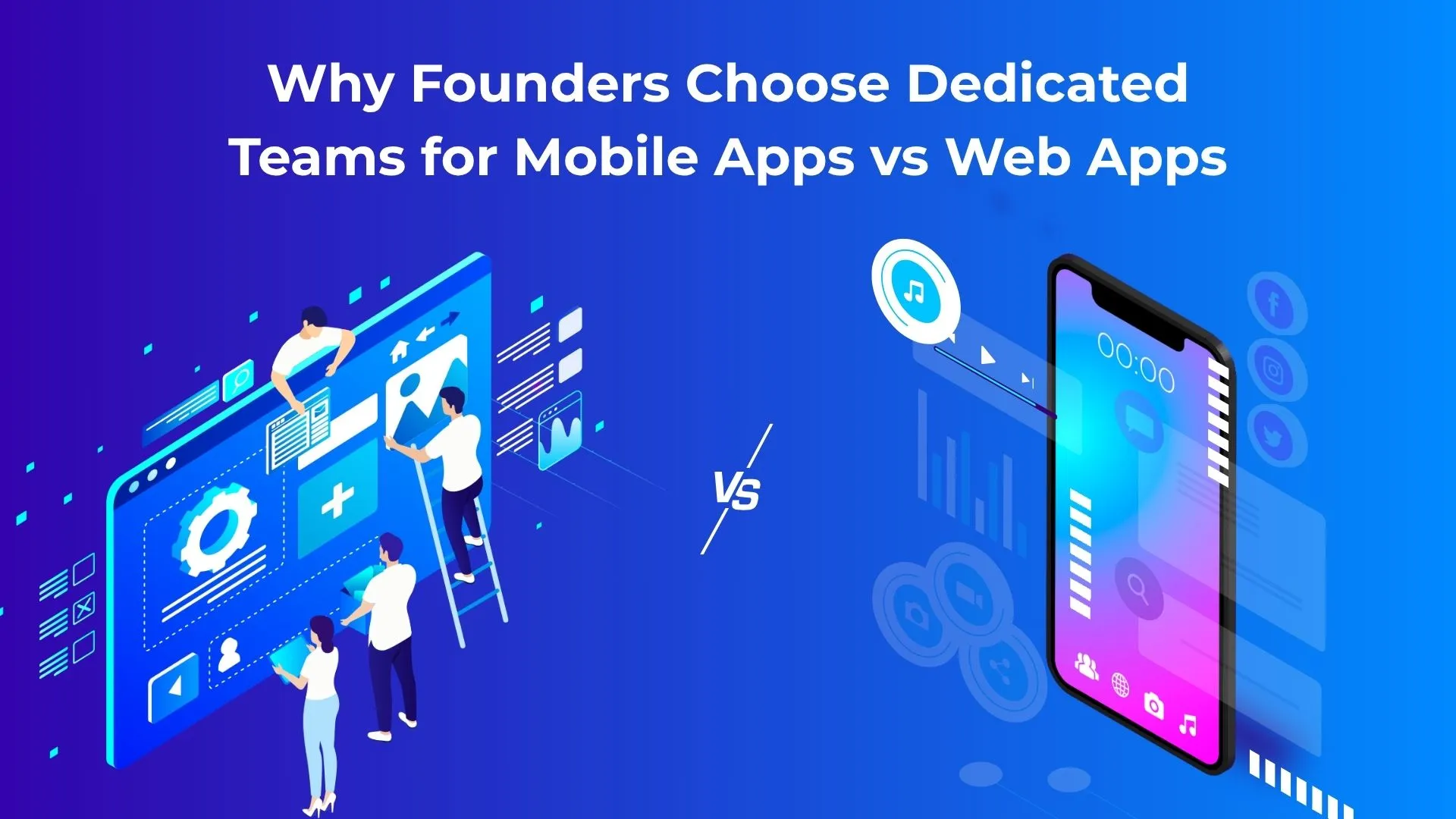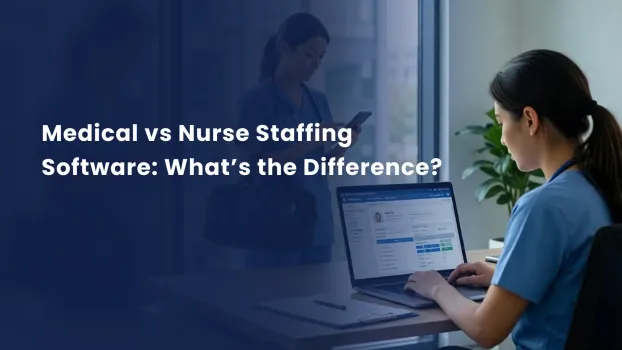Being a founder with no MVP ready yet rather than a plan on that whiteboard, is where the first time entrepreneurship hits you. Your users are itching to try something, and your investors keep asking, “When’s the launch?” But the question that is draining you is Do I build a mobile app or a web app?
And right behind that, another question looms about whom to hire. Whether hiring freelancers, an agency or a dedicated development team will work?
Honestly, this is what we all go through. So to ease down your decision making here are real-world pros, trade-offs, and founder-focused decisions around mobile app vs web app, and understand the reason being European startups hiring dedicated teams more often these days to get it done right.
The App Dilemma: Mobile or Web?
Here’s what most founders get wrong about the “mobile app vs web app” debate, it’s not just about tech. It’s about audience behavior, launch velocity, and long-term engagement.
A mobile app gives you native performance, push notifications, deep hardware access (camera, GPS, biometrics), and lives right on the user’s home screen. That’s premium real estate.
A web app, on the other hand, is frictionless. No download. Works across devices. Also, it is easier to launch, update floats simply and have scalability, especially in those critical MVP stages.
For those who are trying to validate an idea fast, easily, and with lesser resources committed, a web app might feel like a smart move.
On the other hand, if you’re aiming for higher user interaction or functionality like offline access, maps, or media uploads, mobile wins hands down.
Pros Tip: Though web apps win on speed and accessibility but Mobile apps dominate in performance and customer retention.
Why Founders Prefer Dedicated Teams
Now let’s talk about the people building your product. Whether you’re not able to decide between mobile and web, or juggling both, let us sort your hiring problem first. The solution that keeps coming up is hiring a dedicated development team.
Freelancers or project-based agencies are short term, non-committed, and engaged in various different projects. Whereas a dedicated team becomes your long-term partner, though you never have to commit long term but they will only be dedicated to your project. No juggling 10 clients simultaneously.
Here’s why more European founders are looking for dedicated resources:
- You get ownership while they understand your product inside-out.
- Faster Communication using Slack, daily standups, async updates.
- They help you scale, need one designer now, four developers later? Done.
- You can hire dedicated app developers specialized in the tech stack of your choice.
Pro Tip: European startups not only hire coders, rather they build momentum. A dedicated development team gives you continuity, not just code.
The Mobile App Edge (with a Dedicated Team)
Let’s say you’re chasing a mobile app. Great! But it is not as easy as you might think.
Creating a robust mobile app isn’t “one and done.” There are various factors affecting it such as iOS guidelines, android device variations, and app store guidelines, you need people who are experienced and bring expertise to the table.
That’s where a mobile app development team comes in. They’ll handle:
- Native performance tweaks that blow hybrid solutions out of the water.
- An app that integrates easily with device-specific features.
- Store optimization, review handling, crash analytics, and post-launch support.
You could cobble together freelancers, sure. But when your mobile app becomes your product’s front door, you’ll want consistency and expertise, not uncertainty.
Pro Tip: Native mobile isn’t a side hustle. It demands a focused, seasoned team who’ve shipped apps before, and know what to avoid.
When Web Makes More Sense
Now flip it. Maybe your early traction is coming from desktop users. Maybe your SaaS tool is all about browser access. Or maybe you just needed to ship your MVP yesterday.
Web apps are fast to deploy and iterate. You can push updates live without waiting for app store approval. You get immediate feedback loops. And yes, you can still design beautifully responsive experiences that feel like apps on mobile browsers.
Best part about a dedicated development team is you get it all at one place, your frontend and backend connect seamlessly. Also, the security is solid, your page speeds are well-optimized, and your UX feels effortlessly stunning.
They can also plan ahead, setting you up for eventual mobile expansion through progressive web apps or hybrid tech like React Native.
Pro Tip: Web-first doesn’t mean web-only. A dedicated team can lay the groundwork for cross-platform growth.
Performance: Native vs Web
This is a founder trap. People often ask, “Can’t I just build a web app and wrap it as mobile later?”
Sometimes. But when it comes to web app vs native app performance, it’s not just about the speed. It’s about responsiveness. Smooth animations. Device-level features. Offline capability. Deep system access.
Web can simulate a lot. But it can’t replace native.
When your product revolves around precision interactions, say, get real-time delivery tracking, enjoy media editing, and features like AR accelerates your growth, native performance is non-negotiable.
The Hybrid Route? You Bet.
One last nugget: founders don’t have to choose one or the other forever. Plenty of successful startups begin with a web app, validate demand, then move to mobile. Or they start mobile-first and later build a web dashboard.
With a dedicated development team, you can build a long-term architecture that supports both.
They can:
- Use hybrid frameworks smartly (think Flutter or React Native)
- Reuse code efficiently
- Maintain platform-specific UX where needed
- Balance performance and budget
The result? You grow into your platform not against it.
Why WebOConnect Is Your Shortcut to a High-Performance Dedicated Team
If you’re tired of cycling through unreliable freelancers or losing momentum with generic agencies, WebOConnect was built for founders who want focused, flexible execution.
We don’t just help you hire dedicated app developers, we build dedicated development teams that feel in-house without draining your time or budget.
Here’s how we make that happen:
- Time zone alignment: Our teams work when you work. We align with your time zone and sync in with your working hours. Hence, smoother collaboration.
- Experienced professionals: At WebOConnect, we have experts with a minimum 6 months experience. From engineer, designer, to technical project manager, everyone goes through a rigorous screening process for skills, communication, and reliability.
- Timely delivery: We define clear milestones from the very beginning for better transparency.
- Weekly progress reports: With WebOConnect, get clear updates, weekly summaries, and track performance in real-time.
Moreover, if you're wondering how expensive it is to hire a senior React developer in Eastern Europe? We have a simple calculator that gives you budgeting support for planning which developer to hire and with how much experience.
Wrapping Up
Startups from any region they might be are always concerned about moving fast, scaling smarter, and impressing users at every touchpoint. Whether you or for mobile, web, or both, it is your tech choices that should enable that vision, not limit it.
A dedicated development team provides you with consistency, velocity, and expertise to focus on what matters. With dedicated resources, get solutions to real user problems and deliver a standout product.
So before you start posting dev gigs or weighing agency quotes, ask yourself:
Do I want just a finished product, or a team that grows with my company?
If it’s the latter, go dedicated.
FAQs
Q1: What to consider while Web App Development?
Ans: Start with considering cross-platform compatibility. Consider if your operating system works with a single codebase making it more inclusive and cost-effective. Next, factor to look for development and launch timing allowing the market to access quickly.
Q2: Why do web apps not work on mobile?
Ans: Two main reasons why web apps do not actually work with mobile are unresponsive design and slower loading. Also, the website app doesn't adapt to various screens generally. Additionally, bulky images and inefficient code can frustrate or lead users to abandon the sites.
Q3: What is the main advantage of Mobile App?
Ans: Mobile apps advantages include seamless experience, boosts customer engagement, personalize experience, and are essential in driving your product towards success. Moreover, the apps are more convenient and often can be used offline.
Q4: How long does it take to create these apps using dedicated teams?
Ans: The dedicated teams work seamlessly with you providing a quick solution. But the time depends upon the kind of idea you have. Developing an app that works aligned with your vision takes patience, time, and a strategy. So, the time also depends upon various other factors. Book a call with us today to get a proper timeline and enjoy smooth working.


_thumb.webp)
_thumb.webp)















